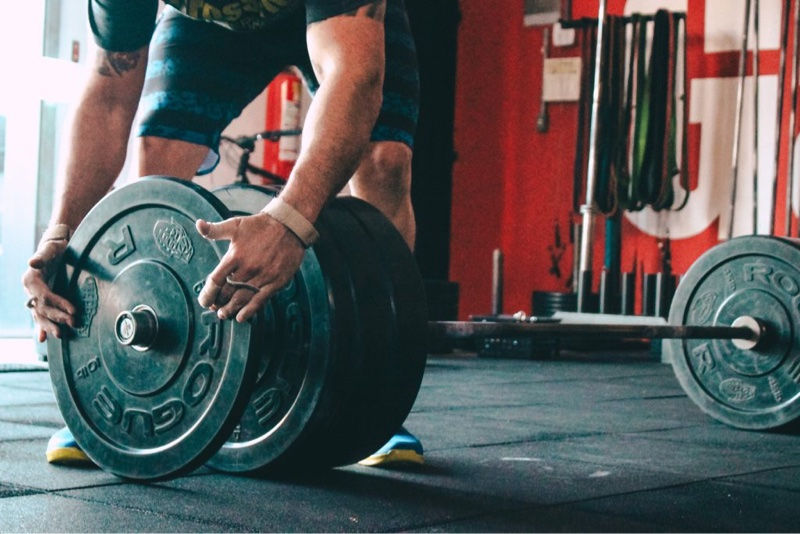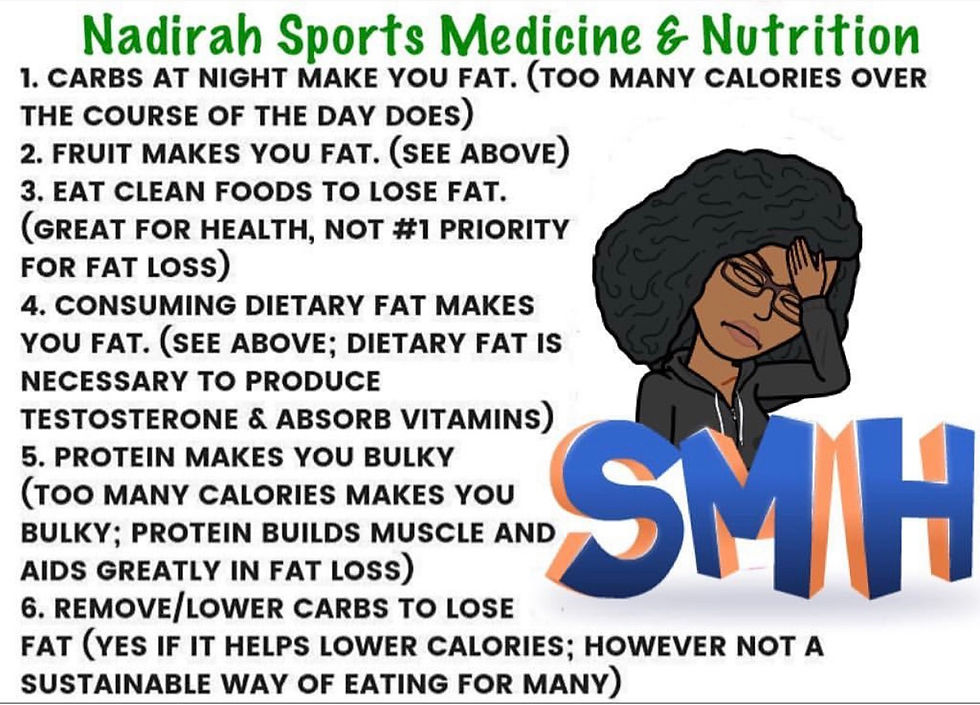Bodybuilding Nutrition 101: The Ins and Outs of Bulking
- nsmnutrition6
- Jul 14, 2019
- 5 min read

When diving into the world of bodybuilding, there are often many unsubstantiated claims made about the use of nutrition and supplements. As bodybuilding becomes more main-stream, the scientific community becomes more interested in developing research-based recommendations. This is a plus for all of you who are looking for the latest and greatest nutrition information to maximize your gains to become the next Arnold Schwarzenegger, Dwayne “The Rock” Johnson, or Terry Crews.
Bodybuilding Phases of Change
There are two main phases to bodybuilding, the bulking phase, and the cutting phase. Nutrition recommendations for these stages look different. During the bulking phase, the goal is to gain as much muscle as possible. Bodybuilders aim to complete the bulking phase in the off-season. Conversely, the purpose of the cutting phase, or pre-competition phase, is to shed body fat.
In this, the first of two blogs, we will focus on the bulking phase of bodybuilding. A cutting post will be featured in part two of Bodybuilding 101.

Nutrition for Gains: Concepts for a Successful Bulk
Although simple at first glance, nutrition’s role is complex during the bulking phase. Well-planned nutrition fuels lifting sessions and muscle hypertrophy, and helps to minimize bulking body fat gains.
With this in mind, now it’s time to get into the nitty-gritty details.
Let’s go over solutions to the nutrition challenges of bodybuilding. We will cover recommendations for protein, calorie surpluses, macros, and nutrient timing. To get you ready for whatever lifting, gaining, or “you name it” goals you have, incorporate these bulking tips into your regime.
Calories
You need to eat more Calories than you expend to develop muscle. Your body uses extra Calories, in association with strength sessions, to build muscle.
To achieve a Calorie surplus, on average aim for about 500 Calories (Cal) more than you need to maintain your weight. For example, the average person needs 2000 Cal. To bulk up, this same person would need 2500 Cal.
Estimate Your Needs
There are many energy need calculators out there. Plug in your values and simply add 500 Cal to the results. Or, manually calculate your energy needs. Try the following equation and multiply it by 1.5-1.8 (1.5 for a sedentary day, and 1.8 for an hour or more of heavy lifting):
Men: Basal Metabolic Rate (BMR) = 88.362 + (13.397 × weight in kg) + (4.799 × height in cm) – (5.677 × age in years)
Women: BMR = 447.593 + (9.247 × weight in kg) + (3.098 × height in cm) – (4.330 × age in years)
Energy equations give you an estimate of your daily caloric needs. Fat-free mass (FFM), or muscle mass, is the main determinant of how many calories you burn. The more you have, the higher your metabolic rate. As such, equations that include FFM are more accurate. So, consider a body composition measurement to get a better idea of your energy needs.
Protein
During the bulking phase, protein helps build muscle and maintain the body. Protein recommendations during bulking are typically 1.2-2.0 g/kg (0.6-0.9 g/lb.) (1). For a 150 lb. person that’s 90-135 g of protein per day.
When should you eat protein? Ensure you have protein following your gym sessions. Some people like the convenience of protein powder, but even skim milk powder can be used. You could also consume protein in the form of egg whites, chicken breast, shrimp or white fish.
Carbohydrates
Carbohydrates are our main source of fuel, so how we time the ingestion of this “fuelling macro” is crucial. During the bulking phase, eat about 4-7 g/kg of body weight of carbohydrates per day, or 270-480 g/day for a 68 kg (150 lb.) person (2). Focus your carbs before and after your workouts to fuel yourself for your lifting sessions, and restore your glycogen stores post-workout.
Are You Meeting Your Needs?

How do you know if you are meeting your individual carbohydrate needs? Pay attention to how your body feels during and after your workout. Even better, ask yourself the following questions, and note your answers:
During my exercise:
Was I able to lift my usual amount?
If you weren’t, it could indicate low glycogen stores.
Did I feel more tired than usual?
If you feel tired, your body might not have enough energy readily available. Carbs can be a source of fast-acting energy.
Did I experience any “fog-brain”?
Your brain runs on carbohydrates. So, if you experienced fog brain, might need more carbs.
Post-workout:
Do I feel shaky?
If you are feeling shaky, this may indicate that your blood sugar could be on the low side. Consider eating a carbohydrate immediately after a workout.
Am I more tired than usual?
Feeling tired can indicate that you don’t have enough carbohydrates available for energy. Your body likes to conserve energy when running on empty. In the absence of enough carbs, your body might think it’s hungry.
Do I feel like everyday tasks require much more energy?
This may indicate that you aren’t eating enough carbs, tricking your body into conserving energy. Often a change in activity levels is experienced when your body feels it’s starved.
These questions will give an idea of your energy level. A low carb diet can leave you fatigued. Simply put, carbs are your body’s favourite energy source. If you answered yes to any of the above despite adequate sleep, and no changes to calorie intake or medical status, consider increasing your carbs.
Post-workout:
Do I feel shaky?
If you are feeling shaky, this may indicate that your blood sugar could be on the low side. Consider eating a carbohydrate immediately after a workout.
Am I more tired than usual?
Feeling tired can indicate that you don’t have enough carbohydrates available for energy. Your body likes to conserve energy when running on empty. In the absence of enough carbs, your body might think it’s hungry.
Do I feel like everyday tasks require much more energy?
This may indicate that you aren’t eating enough carbs, tricking your body into conserving energy. Often a change in activity levels is experienced when your body feels it’s starved.
These questions will give an idea of your energy level. A low carb diet can leave you fatigued. Simply put, carbs are your body’s favourite energy source. If you answered yes to any of the above despite adequate sleep, and no changes to calorie intake or medical status, consider increasing your carbs.
Carbohydrate Recommendations
Consume 0.8 g/kg of carbs with 0.4 g/kg of protein after workouts to increase glycogen stores (2). For the average 150 lb. person, this means 55 g of carbohydrates and 27 grams of protein. An example of a food with this 2:1 ratio is chocolate milk. Or opt for a carb-heavy snack like melons or bananas and a high-protein snack like Greek yogurt.
Final Thoughts

Now that we have given you a run down on bulking nutrition, it’s time for you to test out what works for you. Just remember, the take-home message for bulking is:
Ensure you are in a calorie surplus Eat adequate protein to build muscle Consume enough carbs to fuel and recover Eat an appropriate amount of beneficial fats to maintain health and muscle gains
There may be many schools of thought with bodybuilding, but one thing is for sure, science doesn’t lie. Love life and lift heavy.





Comments